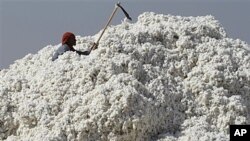India has partially reversed a ban on cotton exports that was imposed to protect domestic supplies.
The ban triggered protests from local farmers and led to an outcry in cotton importing countries such as China as global prices spiked.
The government now says traders can ship cotton for which exporters had already made commitments before the ban was imposed.
India, the world’s second largest cotton producer, abruptly cut off cotton supplies to global buyers on March 4 following a surge in exports that took almost 40 percent of local production. Indian officials said they wanted to ensure sufficient supplies for the local textile industry, which is concerned about shortages and high prices due to strong demand from China.
A cotton-industry group in China called the export ban “irresponsible” and said it would disrupt international trade in cotton. The group had urged a review of the decision.
China is India’s largest customer for cotton. The thriving garment industries of Bangladesh, Thailand and Pakistan are other key importers.
The president of Cotton Association of India, Dhiren Sheth, said exporters were concerned about being unable to meet their commitments.
“It does damage the reputation of the country in terms of being a regular and reliable supplier of cotton,” he said.
In India there was a mixed response to the ban. It was favored by the domestic textile industry -- India's second-largest employer -- which, suffering from a recent downturn, hoped that falling cotton prices would improve its competitiveness among Asian countries.
But India’s farm minister Sharad Pawar expressed concern about the ban's impact on farmers, a sentiment echoed by Sheth, who said local farmers worried that cutting off exports would affect their incomes.
“Otherwise prices will fall and fall sharply," said Sheth. "For example, they fell ten percent once the ban was announced.”
Cotton prices touched an all-time high last year, but have been tapering off in recent months. This is the second time India banned cotton exports. A ban was also imposed in 2010.
News
India Partially Reverses Cotton Exports Ban




